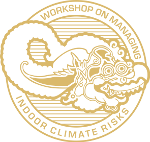 The Directorate of Heritage Conservation and Museums Indonesia and Universitas Gadjah Mada in collaboration with the Cultural Heritage Agency of the Netherlands (RCE) and the Tropenmuseum Amsterdam have developed a workshop that focuses on the practice and discussion of risk-based decision making to optimize the management of indoor climate conditions for collections and buildings. The workshop is sponsored by the ‘Mutual Cultural Heritage’ (MCH) program of the Dutch Ministry of Foreign Affairs.
The Directorate of Heritage Conservation and Museums Indonesia and Universitas Gadjah Mada in collaboration with the Cultural Heritage Agency of the Netherlands (RCE) and the Tropenmuseum Amsterdam have developed a workshop that focuses on the practice and discussion of risk-based decision making to optimize the management of indoor climate conditions for collections and buildings. The workshop is sponsored by the ‘Mutual Cultural Heritage’ (MCH) program of the Dutch Ministry of Foreign Affairs.
The workshop focuses on the practice and discussion of risk-based decision making to optimize the management of indoor climate conditions for collections and buildings. Contents and structure are based on the newly developed Dutch museum indoor climate guidelines, which fit in this risk-based approach. The guidelines are designed especially to respect the significance of both the building and the collections housed inside, matching the possibilities that the building provides with the requirements of the collections in a practical and realistic way. Combining valuation, risk identification and control strategies allows an integrated management of climate risks to collections. They aim to achieve optimum climate conditions while finding good solutions within the available budget that can be sustained in the future. The workshop organizers are interested in building experience with the application of the risk-based approach for climate management under different conditions and contexts, as well as in learning from the developments and experiences with climate control in the MCH priority countries.
PURPOSE
The course is focused on the discovery, discussion and practice of the concepts underlying the decision making process to manage the indoor climate. It examines the best available research. Studying a real case study (museum or archive collection), participants will practice each aspect of this approach, from identifying climate risks to the collection to the development of climate control strategies. The course emphasizes on risk communication and teamwork.
OBJECTIVES
At the end of the course, participants will be able to:
- carry out value assessments of collections and buildings in different contexts, in particular taking into account the relationship between collections and the buildings where they are kept;
- understand the main factors regulating and affecting the indoor climate;
- assess the susceptibility of different types of collections and building interior elements to different indoor climate conditions;
- develop and access options to mitigate indoor climate risks to collections and building interiors;
- apply value-based and risk-based decision making for achieving sustainable conservation actions;
- better understand indoor climate challenges and solutions in different heritage contexts by sharing knowledge and experiences during the course .
COURSE METHODOLOGY
The complete workshop is devided into two separate parts:
- Writing and presenting the climate risks that you face within your own working situation
The workshop will start by identifying the climate risks that individual participants face within in their own working environment. The participants are required to write a short article that should be delivered during the workshop in october. The process of writing and collecting information will be close coordinated and reviewed at long distance by the course teachers.
- Workshop
The face-to-face workshop is an intensive program combining both theory and practice, through lectures, case studies and practical exercises. High level interaction is encouraged in the course with participants playing an important part.
PARTICIPANTS
The course is designed to for participants to critically review their working situation regarding the indoor climate and more importantly to build a national network by bringing together professionals responsible for managing or taking care of heritage collections and of buildings in Indonesia and the region, with a minimum of 3 years experience. Preference will be given to professionals who have an active role in disseminating knowledge at national level.
The participants will be required to spend some time between april and October 2013 and 1 week full time in Yogyakarta in October 2013.
TEACHING TEAM
The Cultural Heritage Agency of the Netherlands,
Tropenmuseum,
Universitas Gadjah Mada
WORKING LANGUAGE
English.
TRAVEL, ACCOMODATION AND LIVING EXPENSES
The selected Indonesian participants will receive a scholarship by the Indonesian government covering round-trip travel from their city of origin to Yogyakarta, hotel, food and daily expenses. Participants from the region will have to cover their own costs for hotel, food and daily expenes.
APPLICATION
Candidates must submit a formal application (http://www.cultureelerfgoed.nl)
Regional participants will be required to provide evidence of medical insurance during the course.
Applications should be sent to: b.ankersmit@cultureelerfgoed.nl
Application deadline: 30 Mei 2013
Dates april – october 2013
Workshop 20-25 october 2013
Location Yogyakarta, Indonesia
Organisers Directorat Pelestarian Cagar Budaya dan Permuseuman
The Gadjah Mada University
The Cultural Heriatge Agency of the Netherlands (RCE)
Tropenmuseum, the Netherlands
